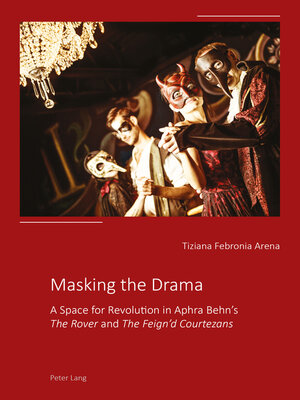Masking the Drama
ebook ∣ A Space for Revolution in Aphra Behn's «The Rover» and «The Feign'd Courtezans»
By Tiziana Febronia Arena

Sign up to save your library
With an OverDrive account, you can save your favorite libraries for at-a-glance information about availability. Find out more about OverDrive accounts.
Find this title in Libby, the library reading app by OverDrive.



Search for a digital library with this title
Title found at these libraries:
| Library Name | Distance |
|---|---|
| Loading... |
«Masking the Drama: A Space for Revolution in Aphra Behn's The Rover and The Feign'd Courtezans» pursues an in-depth investigation of the process whereby female identity was performatively negotiated on the Restoration stage by women playwrights such as Aphra Behn and of how a new articulation of social space contributed to the formation of a potentially emancipatory sense of gendered selfhood understood as a flexible and porous instantiation of performative roles.
The author interrogates the prominent role played among Restoration women playwrights by the tropes of theatrical performativity as providing an alternative path to feminist revision and thus offering new perspectives on and challenges to existing scholarship on early modern women's studies and the status of Aphra Behn studies in this scholarly context and stressing how women challenged, transgressed and subverted heteropatriarchal normativity by stepping outside their allotted social roles to appropriate a female space within the public domain of the theatre.
From within a widely-argued critical discourse concerning masking and masquerade, the book takes a novel look at Behn's internal and external mental conditionings, arguing that they still lived on even though the political divisions which had sustained their ideological rationale were no longer in place. One of the thesis's critical edges lies here: rather than fixing Behn's representational discourse within a rigid revolutionary/conservative dialectics, even when such a narrative of difference partly informs the plays analysed, the author convincingly argues against any monolithic view, thus eschewing the risk of ideological reductionism. The book brilliantly fashions a novel narrative of cultural phenomena especially relevant to the discussion of such a self-contradictory artist as Aphra Behn arguably is.







